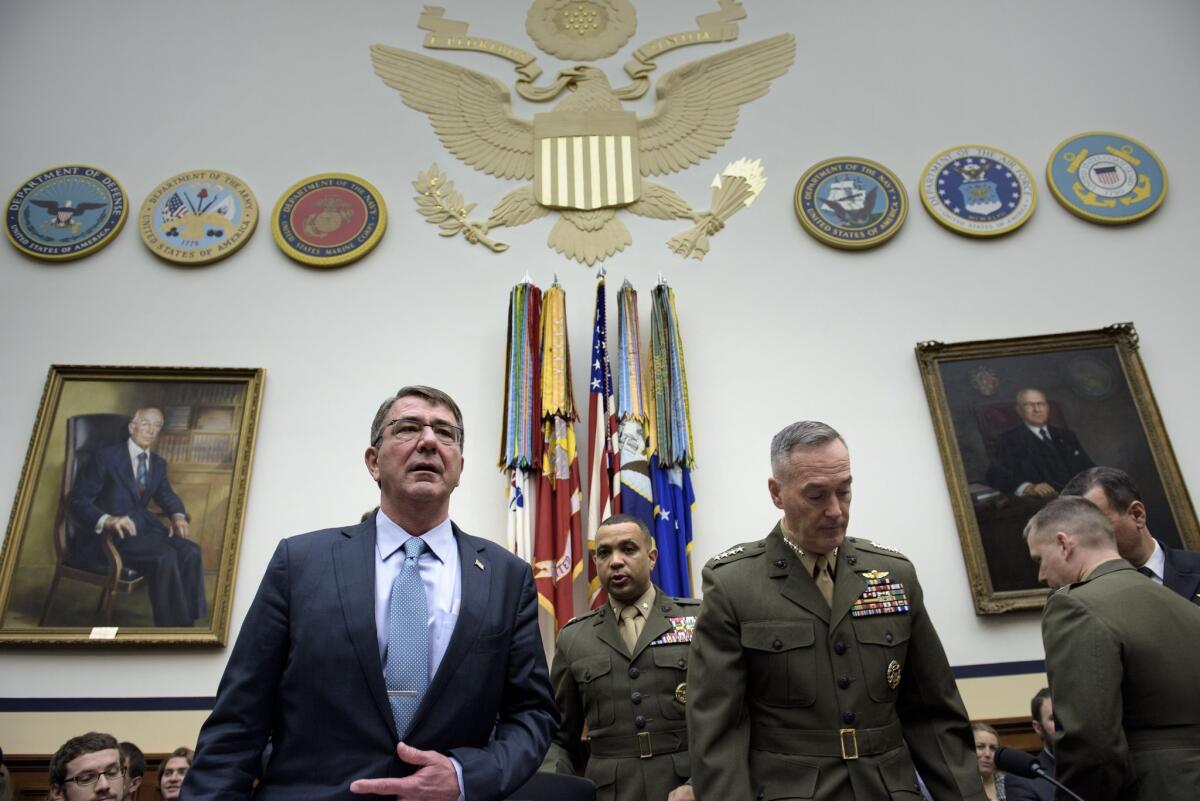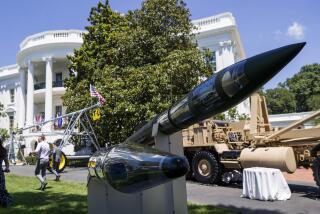U.S. to send about 200 more special operations troops to Iraq to fight Islamic State

Defense Secretary Ashton Carter and Chairman of the Joint Chiefs of Staff Gen. Joseph Dunford arrive for a hearing of the House Armed Services Committee on Dec. 1.
Reporting from Washington — The Pentagon plans to deploy about 200 more special operations troops to Iraq and has stepped up airstrikes in an effort to break a military stalemate with Islamic State, Defense Secretary Ashton Carter told Congress on Tuesday.
“Specialized expeditionary targeting force” members will serve as advisors to the Iraqi military and Kurdish militias, and will help facilitate the U.S.-led coalition’s air campaign, Carter told the House Armed Services Committee.
“These special operators will over time be able to conduct raids, free hostages, gather intelligence and capture” Islamic State leaders in Iraq, he said. “That creates a virtuous cycle of better intelligence, which generates more targets, more raids and more momentum.”
The new force ultimately will be able to launch raids and other operations against Islamic State targets in Syria, he added.
“It puts everyone on notice in Syria: You don’t know at night who’s coming through the window,” Carter said.
The shift marks a deepening involvement for the U.S. military, which has deployed about 3,500 troops at six sites in Iraq over the last 16 months to help train and advise Iraqi security forces.
The Pentagon also recently deployed fewer than 50 U.S. special operators to Kurdish-controlled areas in northeastern Syria to advise vetted Syrian and Kurdish rebel groups.
Carter did not say how many new troops will be sent to Iraq, but a U.S. defense official, who was not authorized to speak publicly on the mission, said the force would consist of about 200 special operators, search and rescue personnel and other related forces.
The increase comes as coalition aircraft on ships and in regional bases launched a record number of airstrikes against Islamic State in November.
“We’re at war,” Carter said. “Tens of thousands of U.S. personnel are operating in the broader Middle East region, and more are on the way.”
That blunt characterization appeared to surprise lawmakers, who peppered Carter with questions about Obama administration strategy.
“It’s not war in a technical sense, but this is serious business,” he responded. “It feels that way to our people.”
Marine Gen. Joseph F. Dunford Jr., chairman of the Joint Chiefs of Staff, said the new force would accelerate the gathering of useful intelligence and “will make our operations much more effective.”
“In the days ahead, we’ll be aggressive in looking for ways to reinforce success,” Dunford said. “And we’ll seize every opportunity to increase the tempo and effectiveness of our operations.”
The White House has come under growing criticism for the continued impasse since the Nov. 13 terrorist attacks in Paris, with critics in both parties calling for a stronger U.S. effort. Islamic State has retreated from some areas, but still holds major cities in Sunni-dominated parts of Syria and Iraq.
But Carter’s plan raises fresh questions about the expanding American role in Iraq and Syria, and President Obama’s vow to not put U.S. “boots on the ground” to fight the extremist group.
Sen. John McCain (R-Ariz.), chairman of the Senate Armed Services Committee and a harsh critic of the administration policy, called the latest escalation a “belated step forward.”
“However, today’s announcement is yet another reactive and incremental step, specifically responding to the Paris attacks, in a policy that has allowed the ISIL threat to metastasize to Libya, Afghanistan, and elsewhere across the globe,” McCain said in a statement, using one of the acronyms for Islamic State. “A comprehensive strategy to defeat ISIL is totally absent, urgently needed, and long overdue.”
In his testimony Tuesday, Carter said Turkey “must do more” to control its often-porous border with Syria to prevent Islamic State from smuggling goods and fighters to and from the battlefield.
He also acknowledged that only a handful of the 65 countries in the U.S.-led coalition are conducting airstrikes or otherwise participating in military operations. U.S. warplanes have carried out the vast majority of more than 8,200 airstrikes so far.
“Saudi Arabia and the gulf states joined the air campaign in the early days but have since been preoccupied by the conflict in Yemen,” he said.
Follow @wjhenn for military and defense info.
ALSO
AirAsia crash probe blames faulty rudder system, pilots’ response
Obama: I don’t expect Putin to do a ‘180’ to help fight Islamic State
Downing of Russian warplane shines a light on Turkey’s shadowy links to extremists
More to Read
Sign up for Essential California
The most important California stories and recommendations in your inbox every morning.
You may occasionally receive promotional content from the Los Angeles Times.











